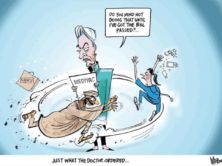
Man pointing finger. (Credit: A2gemma via Flickr)
Former DailyMail.com reporter James King accused the publication of training him to steal other publications’ work and make purposeful errors. King says he wrote more than 500 articles for the publication.
“The Mail’s editorial model depends on little more than dishonesty, theft of copyrighted material, and sensationalism so absurd that it crosses into fabrication,” former DailyMail.com writer King claimed of his 14 months working as a freelancer for the tabloid’s website in New York.
In a March 4 tell-all for Gawker, King alleged the outlet MailOnline (now DailyMail.com) stole from other outlets, purposely made errors in stories, and broke other ethics standards.
“In a little more than a year of working in the Mail’s New York newsroom, I saw basic journalism standards and ethics casually and routinely ignored. I saw other publications’ work lifted wholesale,” King wrote. “I watched editors at the most highly trafficked English-language online newspaper in the world publish information they knew to be inaccurate.”
King accused the site of promoting sensationalist and false headlines, re-writing other outlets’ work without any original information, not advocating attribution to other outlets, and inserting errors into articles.
“As part of my initial training session, I was told that any link or attribution in an aggregated piece should be placed no higher than the first set of images in the post—which were typically three or four paragraphs in, where a reader might overlook the fact that the information provided in the preceding paragraphs had no attribution,” King claimed, adding that the Mail didn’t want to attribute information to the competing newspaper, the New York Daily News.
King said that he was at one point offered a full-time position but he “turned down the promotion” because as a freelancer he didn’t have to use his name on his story bylines.
“After watching editors frequently change things I’d written without telling me or without checking whether the changes were accurate I decided I didn’t want my byline on my work,” he wrote.
King didn’t just made generalized claims; he specifically listed incidents in which he alleged the Mail published false information and the Mail was subject to legal threats by subjects of stories.
He claimed he wrote “some 500 articles” without his bylines but there were six instances where his name was used on his stories. King also accused the Mail of stealing his work (direct quotations without attribution) from another outlet from before he even worked for the site.
In response, DailyMail.com managing editor Rhiannon Macdonald in New York slammed King’s claims, calling him an “unreliable” freelancer who “had to be repeatedly reminded about the need for proper attribution in his work,” the Guardian‘s Roy Greenslade reported.
Gawker updated King’s report with the Mail’s denials.
“We utterly refute James King’s claim that DailyMail.com depends on ‘dishonesty, theft of copyright material’, and the publication of material we ‘know to be inaccurate,'” the Mail said, adding that the Washington Post “rejected” King’s similar pitch on a story about working for the Mail last year because of “inaccuracies and his unreliability.” iMediaEthics asked the Post for confirmation, but the Post responded, “I’m sorry, we can’t help you with this.”
The Mail also rebutted King’s specific claims about errors, including claims the Mail intentionally published the wrong photo of a woman who died of cancer, that the Mail tried to “make light of its error” in reporting on George Clooney and his then-fiance Amal Alamuddin, and that the Mail labeled a photo of a woman who isn’t an HIV-positive porn star as a woman who is a HIV-positive porn star.
The Mail also denied that it didn’t want staff linking to competitor the New York Daily News and wanted attribution buried.
That isn’t to say the Mail gets off scot-free. For example, with the porn star photo, the Mail admitted it used a stock image of a porn star with the story on the HIV-positive porn star and the woman sued so the Mail deleted the picture. The Mail also fessed up to publishing a false story about Taylor Swift that it later unpublished because her PR reps complained about its inaccuracy.
King then responded to the Mail’s response, which he said “range[d] from the factually untrue to the obviously disingenuous to the simply irrelevant.”
Ultimately, this battle is unresolved with both King and the Mail standing by their sides of the story.





